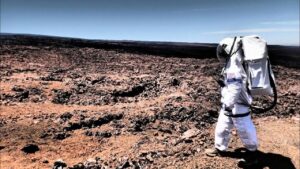by Hazel Anna Rogers for the Carl Kruse Blog
In 1993, sociologist and avid caver Maurizio Montalbini endured 366 days underground in a Nasa-designed underground cave. His concept of time was altered so greatly that when he emerged, blindfolded against the violent glare of the eastern Italian sun, Montalbini was convinced that he had only been underground for 219 days. His waking and sleeping hours had adjusted drastically, with Montalbini spending nearly twice as long awake and asleep as he would up above on the surface.
Montalbini’s experience was intended to act as a simulation of the long-term isolation of a space mission. Should, as it has been proposed, the Mars One Mission go ahead, chosen astronauts, or ‘colonists’, would become the most isolated humans to ever have lived. Contact would be limited to the three initial participants in the mission for the first two years, and then to 23 after ten years.

I have felt isolated before. There have been periods in my life when I have felt so alone that I felt I might go mad. It is strange that here, in the city, with all its warm bodies and soft faces and feet drifting endlessly by, one can feel so very alone. But what I describe is an isolation from meaningful connection, which is most terrible in itself, but it is not akin to what the colonists will experience on Mars One. Theirs would be an isolation from earth, from flowers quivering in the wind, from flies slapping against the windows in summer, from the glare of a stream reflecting the late winter sun. Theirs would be an isolation from rain and snow, from the clatter of spoons and indistinguishable chatter of a coffee shop, from the whistle of a bird calling at the sleepy morn, from the sweet laughter of a bar at dusk, from the wailing of sirens, from the calm roar of cars, from life. Theirs would be an isolation from all that we call life.
It is difficult to foretell the psychological and physiological effects that such a mission would have on a human. We say that, sometimes, one can feel most alone in a crowd of people, but what could compare to the loneliness of looking out through glass at a planet you can’t touch and air you cannot breathe, with only a select few other humans to understand how it feels to know that you might never see your daughter, or your lover, or your parents, or your friends, ever again?
In 1951, at McGill University Medical Centre in Montreal, psychologist Donald Hebb performed a set of experiments on paid volunteers to illustrate the effects of extreme isolation, including sensory deprivation through the use of clouded goggles, gloves, cardboard tubes over their arms, and earphones, with white noise being played through a loudspeaker. The participants, after but a few hours, experienced intense hallucinations, poor cognitive ability, and lack of control in their emotional responses. Part of the purpose of Hebb’s experiment was to attempt to find a defence against the purported war tactic of Soviets at the time to use sensory deprivation to brainwash Canadian Prisoners of War. And yet, to this day, the US have more prisoners in solitary confinement than any other country. It is routine practice. But that’s a conversation for another day.
So if, within only a few hours or days, a person living with sensory deprivation can experience such drastic shifts in their psychological ability, then there is no telling what kind of changes would occur in a human living on Mars for years at a time. To me, it is torture unimaginable. But what do I know? What if these colonists had been waiting their whole lives for this moment, for this chance to see a sight that no-one else could possibly imagine? And what if it is beautiful? And what if it is peaceful, away from the pain and noise of Earth?
I don’t know. Nobody knows, not really.
=========
This Carl Kruse Blog homepage is at https://carlkruse.at
Contact: carl AT carlkruse DOT com
Other articles by Hazel include Single Mums, On Ancient Travel Writing and Grimes.
Also find Carl Kruse at the Kruse on BOINC Asteroids and Kruse on BOINC DENIS projects.
